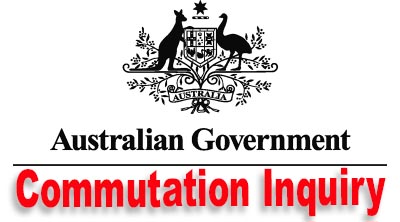Independent Inquiry into DFRDB commutation

Minister for Veterans’ Affairs Darren Chester today announced an independent inquiry to examine the information provided by scheme administrators and relevant departments to members of the Defence Force Retirement and Death Benefits (DFRDB) superannuation scheme.
The DFRDB scheme, which was established in 1972 and closed to new members in 1991, allowed members to commute (exchange) part of their pension for a lump sum.
“There are different views among some in the veteran community about certain areas of the scheme and the appropriateness of information provided to members at the time,” Minister Chester said.
“The government recognises the importance of open and transparent discussion around veteran concerns and we will consult with the ex-service community about the terms of reference for the inquiry, as well as panel membership.
“Ex-service organisations and scheme members will have the opportunity to make submissions to the inquiry and raise any other concerns relevant to the scheme.”
This inquiry is on the agenda for the next Ex-Service Organisation Round Table, to be held on 2 April 2019.
.
.
.
.
.
.

.
.






I’d like to contact Christian BENNET to discuss a legal issue with the DFRDB Act that may resolve many issues.
I will pass on your request to him.
This isa disagrace. It is not an Inquiry into Commutation injustice it is an Inquiry into all teh injustices of teh DFRDB Scheme as first recogniswed and acknowledged by teh Abbot Government in 2014.
The ADFRA represenst thousands of Service men and woman and is being ignored by some isolationnist members fro reasonsonky they can explain. Their are two linbs to our claim:
a. All DFRDB pensions be re-baselined to what they should have been set to in 2014 when the indexation was changed, including removal of discrimination through “unfair and inequitable” indexation for recipients aged under 55 and for indexation to be applied to each individual’s entire future pension stream (not the partial amount determined by members’ 1962 life expectancy, as at present);
c. The Commonwealth to immediately stop deduction of repayment of lump sum advances from the moment the original commuted amount has been repaid; and for each pensioner be refunded, any deduction in excess of their individual commuted amount.
REDRESS OF DFRDB PENSION INJUSTICE FOR FORMER ADF PERSONNEL
EXECUTIVE SUMMARY
PURPOSE
1. DFRDB Pensioners and their spouses exceed 50,000; many are old and domiciled in nursing homes. They have been subjected to harsh and unconscionable treatment by the Commonwealth Government. Their vulnerability, limited bargaining power, trust and lack of representation has been exploited.
2. In 2014, the Government agreed that the method of indexation was wrong and legislated a correction that it should be the “better of the CPI, PBLCI and MTAWE”. But this correction failed to adjust the pension base line of each pensioner to what it would have been had fair and reasonable indexation been applied to ensure relative purchasing power of pensions from each Pensioner’s date of pension commencement (i.e. discharge).
3. The purpose of this paper is to present the case for redress of the losses and detriment to DFRDB Pensioners caused by decisions and policy by Government in its administration of the DFRDB Scheme.
AIM
4. To gain all stakeholders endorsement to pursue the following action:
a. All DFRDB pensions be re-baselined to what they should have been set to in 2014 when the indexation was changed, including removal of discrimination through “unfair and inequitable” indexation for recipients aged under 55;
b. Indexation to be applied to each individual’s entire future pension stream (not the partial amount determined by members’ 1962 life expectancy, as at present);
c. The Commonwealth to immediately stop deduction of repayment of lump sum advances from the moment the original commuted amount has been repaid; and
d. Each pensioner be refunded, any deduction in excess of their individual commuted amount.
INDEXATION
5. Relativity of pensions is a fundamental right established under the original 1973 legislation and carried over from the old DFRB Scheme. As such it is a fundamental and pre-existing right and in the absence of an express intention in the new legislation to deny it, the statutory interpretation rule of presumption established in Coco v The Queen (1994) applies i.e. that the Parliament will not remove a fundamental right unless by express statement in the legislation. It provides conclusive evidence of the Government’s intention to retain relativity. The presumption is supported by the Government’s express intention to maintain relativity in the subsequent Military Superannuation scheme as documented in its 2011 advice to prospective DFRDB Pensioners. In 2014 the Abbott government acknowledged that the indexation system then in use was inequitable, unfair and the source of a justified long-standing grievance. The legislated change which merged failed to redress this grievance.
6. Relativity requires translation of current NOMINAL dollars to REAL dollars baselined to the time a member’s pension begins.
7. The magnitude of this legislative failure is revealed in Annex A which demonstrates how CPI indexed pensions have lost 25.5% of relative value since 1991 – i.e., lost every year for life.
OVER REPAYMENT OF COMMUTATION
8. Commutation is defined as a one-time lump-sum advance payment of a portion of accrued future superannuation entitlements.
9. There is no statutory basis to suggest that Commutation implies an agreement to surrender all future rights to pension beyond an amount equivalent to the repayment of the lump sum advance. It is contrary to all principles of “Equity” and fairness that commutation ever implied an agreement to forego the relevant portion of the pension and a similar portion of any likely pension increase. Such practice breaches the government’s fiduciary obligations to make decisions in accordance with its obligation of primary loyalty to Pensioners, without any conflict of interest and without any budgetary or other gain.
10. All Pensioners, as the objects of the Trust, have the right to a reasonable expectation of fair, reasonable and conscionable conduct in the demands of government for repayment of the advances against their accrued entitlements. The reverse has occurred. The government has used its’ dominant power and position of trust to the detriment of Pensioners for government gain and done so with a clear conflict of interest.
11. It has also breached its mandatory and very prescriptive obligations for full and frank disclosure at the time the commutation decision was made by each Pensioner. It has denied Pensioners the information necessary to make an informed decision. The limitation period for claim to redress this deficiency is the time each Pensioner was/is informed or becomes aware of the deficient information. And the onus is on the party with the obligation to disclose to prove on the balance of probabilities that those obligations were met; not the reverse.
12. The interpretation of the meaning and methodology of commutation in the ComSuper policy handbook is repugnant to, and inconsistent with the legislation. The policy ensures that pensioners who die beyond their notional life expectancy date (NLE) subsidise or offset the rebates due from those who don’t. They suffer discrimination because they live longer. Further, the method of indexation applied to commutation pay-back deductions is not supported by the legislation, is unreasonable and ensures excessive amounts are rebated to Government. The Government has gained by transferring the liability of Pensioners who die prior to their NLE to those who don’t and gained again by not having to pay out on the pension they would have received had they achieved their NLE.
13. Commutation over payments should cease forthwith with all over payments returned to Veterans.